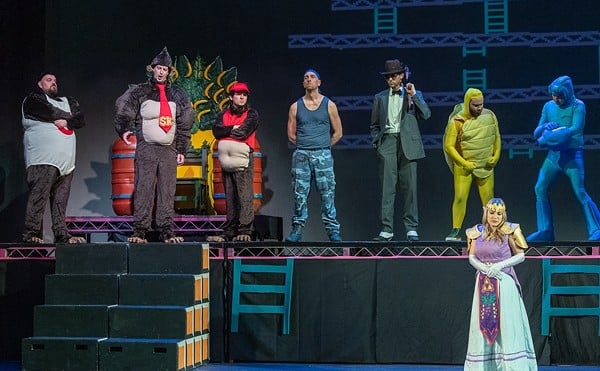By the edge of the fountain, when no one was looking, my hope came to nothing. — Federico Garcia Lorca, Mariana Pineda
Ainadamar is an old well located north of Granada. The name is Arabic for "Fountain of Tears," and it was there that Spain’s preeminent poet and dramatist Federico Garcia Lorca was murdered by Falangists in August 1936.
Less than a decade earlier, Lorca eerily foretold his death in his play about Mariana Pineda, the Spanish national heroine whose political activities led to her execution in 1831. The title role was performed by Margarita Xingu, Lorca’s close friend and artistic collaborator who devoted herself to staging Lorca’s works until her death in 1969.
Lorca and his death are at the core of Osvaldo Gulijov’s opera Ainadamar, presented this week at Music Hall by Cincinnati Opera — but it is Margarita who weaves the stories together as she stands in the wings of a theater in Montevideo waiting to play Mariana one last time.
“I was blown out of my seat at the world premiere at Tanglewood in 2003,” recalls Cincinnati Opera Artistic Director Evans Mirageas. “I’ve loved Lorca’s poetry since I was a kid and knew next to nothing about his life or death. With the power of the music that Osvaldo wrote and the way David Henry Hwang (author of M. Butterfly) renders the words, this is an experience that anyone can enter into, whether or not they know about Lorca or opera.”
Lorca was a genuinely musical writer. He was a classically trained musician (recordings of him playing piano exist), wrote songs and immersed himself in the Gypsy music of his native Andalucia. He was also an accomplished visual artist, a colleague of Salvador Dali and Luis Bunuel.
In 1922, Lorca and composer Manuel de Falla produced a festival of cante jondo, or deep song, devoted to the Flamenco tradition and its roots. Lorca wrote, “The melody begins, an undulant, endless melody. (It) loses itself horizontally, escapes from our hands as we see it withdraw from us toward a point of common longing and perfect passion.” Lorca’s statement is Gulijov’s catalyst.
Argentine composer Osvaldo Gulijov is acclaimed for his synthesis of Classical, popular and Folk music, and his work is performed by Rock bands, tango ensembles and Klezmer groups in addition to symphonic and chamber orchestras. Ainadamar’s score is “extremely close to Lorca’s spirit,” says conductor Miguel Harth-Bedoya, who refers to the work as a music drama in which personal and political passions play out in a soundscape that meshes primal Flamenco rhythms and vocalism with Classical operatic forms and computer-generated sound effects.
The laptop is a crucial element, integrating the sounds of hoof beats, water and, in the opera’s most chilling segment, the sounds of gunfire and falling shell casings that morph into a driving flamenco rhythm.
“The sound of the orchestra is such a character — the percussion and the guitars — it’s mind blowing,“ says director Jose Maria Condemi. And so the orchestra will be onstage along with the performers.
The story and its characters have special resonance for CCM alum Condemi, also a native of Argentina who grew up in the years of the military junta, an era as brutally destructive as that of the Spanish Civil war.
“You couldn’t speak out,” Condemi says. “If you did, there was the constant fear that you would be killed.”
But Lorca’s works were taught in schools and widely read. And the actress Margarita Xirgu “is a very familiar character for me,” says Condemi. “Not only did she perform a lot in Argentina, but many theaters and the big acting school in Buenos Aires are named after her.”
Condemi’s staging is based on composer Gulijov’s comments on the fragile nature of reality.
“I’m interested in the ritualistic aspects of the story,“ Condemi explains. “This piece is so fluid. It takes place in Margarita’s mind and the opera happens in images instead of conventional scenes.”
The action will be staged in front of the orchestra and in front of the proscenium, “almost at the edge.” With no sets, performers will use body language and props to create the transformations from image to image. Even the libretto is a transformation: Gulijov translated Hwang’s English into Spanish.
A female chorus sings a ballad about Mariana Pineda at the beginning of each image, and the part of Lorca is sung by mezzo-soprano Kelley O’Connor, who performed the role in the revised version directed by Peter Sellars at Santa Fe in 2005. Soprano Dawn Upshaw is Margarita, a role she originated at the Tanglewood premiere. Flamenco singer Jesus Montoya is Ruiz Alonso, the Falangist officer who arrested Lorca and carried out his execution.
“I wasn’t prepared for the lyricism and how moving it is,” Condemi says. “The piece has an incredible heart. I challenge anybody not to be moved to tears at the end.”
Adds conductor Harth-Bedoya: “There is such beauty in the music. It comes from the soul and it sounds like it.”
Ainadamar doesn’t try to explain why Lorca was murdered. Lorca himself swore, “I will never, never be political.” He later described himself as “Catholic, communist, anarchist, libertarian, monarchist.” He identified with liberal causes but had friends in Franco‘s regime.
Others believe that the forces were more personal than political. Lorca was a gay man, an artist envied for his talent and success. Such a man would not be tolerated in Franco’s Spain, but even as Spain retreated into a dark age the self-exiled Margarita Xirgu kept Lorca’s words vividly alive.
AINADAMAR will be performed by Cincinnati Opera at 7:30 p.m. Thursday and Saturday at Music Hall. Buy tickets, check out performance times and find nearby bars and restaurants here.
See Anne Arenstein's 2009 Cincinnati Opera season preview here.






